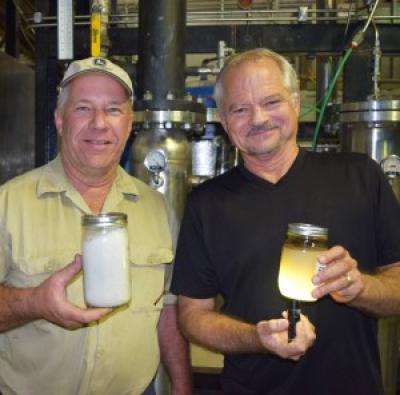Waste-to-energy showcase for reluctant New Zealand dairy sector
A 1,100-cow dairy in southern California became the first-ever operation in the world known to produce no-sulfur renewable diesel products from manure on a livestock facility in late April.
The milestone is the culmination of three years of collaboration between Scott Brothers Dairy in San Jacinto, California, and Ag Waste Solutions (AWS), a privately held company that designed the farm’s manure processing system.
“To make it to the top of the hill is a euphoric moment,” dairyman Bruce Scott says.
Steve McCorkle, founder and CEO of AWS, announced the partnership’s achievement on Facebook on April 27, 2015. The company claims its technology is the “future of sustainable farming.”
“We have proven that we can complete the circle of energy for individual farms while creating profit centers from manure, enabling farmers to exceed regulatory requirements and truly control their own destiny,” McCorkle said in a statement.
Scott says he is most proud to have produced a “deliverable” for the California Energy Commission, which helped fund the project. As far as he understands, the commission has no other no-sulfur diesel projects dealing with this type of waste stream, so he is pleased to have “crossed the finish line” by submitting a final report. The next step for the system is to prove it can operate continuously and thus be a commercially viable option for other agricultural operations.
“I didn’t expect to win over favor on this project quickly. But I’ve firmly believed in the direction of this project,” Scott says. “The tunnel may have gotten longer, but the light at the end of it has always stayed visible in my mind. I still believe it’s the most viable technology to get rid of a waste stream and produce something that’s value-added at the same time.”
Processing manure into renewable diesel products is just one of the system’s manure processing capabilities.
The dairy’s multi-stage system first separates high-BTU manure solids from the dairy’s liquid manure effluent. McCorkle says the first stage removes 98 percent of the total suspended solids and 40 percent of the dissolved solids, making good irrigation water for most farms.
The extracted water is further purified at Scott Brothers Dairy to remove the other 2 percent of suspended solids and the remaining dissolved solids, making the water potable. (This step was to satisfy manure application requirements that were specific to the dairy’s regional regulatory agency. See this Progressive Dairyman Feb. 7, 2014 article for more background about dairy’s unique permitting situation.)
The dairy’s manure solids are then fed to a pyrolysis gasifier. The gas production module then thermochemically decomposes the manure solids in the absence of air to produce syngas. The gas is then scrubbed of impurities and compressed for storage.
Using a Fischer-Tropsch process, the hydrogen and carbon in the gas is then converted in the system’s final stage into no-sulfur renewable diesel products. The Fischer-Tropsch process had been used to convert other feedstocks to renewable diesel but until recently was never proven to work with manure, let alone on a farm.
Perhaps more importantly than producing diesel, the process also produces a refined wax product in a controllable diesel-to-wax ratio. McCorkle says the wax product’s market value is three times that of the renewable diesel and can be further processed or blended off-site with other petroleum products, such as jet fuel or kerosene.
“We exceeded our own expectations on the first pass,” McCorkle says. “We were able to control the types and factions of liquids and waxes created. And we were able to attain the optimal ratio of liquids and waxes. This satisfies our business model of making enough diesel fuel for farm use and selling the wax products off-farm to create additional profit centers from manure.”
The system on Scott Brothers Dairy that produces renewable diesel products was built at pilot-project scale, meaning it is not commercially sized nor automated enough in order to operate 24-7 with minimal manpower.If the dairy had an adequately sized liquid fuels production module that ran continuously, it could produce at least 1 gallon of diesel fuel from three cows’ manure for a day. Right now the system can convert only one-eighth of the dairy’s gasified manure per day and has not yet been automated to run continuously.
The first production run of renewable diesel products was evaluated in an on-site lab as well as sent to an external lab for validation.. Future production runs will be tested to validate the fuel is consistently comparable, or superior, to other diesel fuels. Initial tests have shown the fuel has very similar characteristics to pump diesel but without detectable levels of sulfur. Even ultra low-sulfur pump diesel contains up to 15 ppm of sulfur.
When asked if it passed the sniff test and whether he would put it in his own tractor, Scott says: “No question about it.”
McCorkle suggests the next steps toward a commercially viable, 24-7 system require more funding to upsize the liquid fuels production module in order to match the size of the rest of the system and to demonstrate that the system can run continuously and more automatically with predictable results and with minimal personnel.
McCorkle is optimistic both goals can be achieved. For now, his countenance glows over the petrochemical milestone he and the dairy have achieved almost entirely by themselves.
“We didn’t achieve these results in a large, complex refinery with tens of engineers, chemists and scientists. We achieved these results with only a handful of people working in a remote farm environment,” McCorkle says.
| From the This email address is being protected from spambots. You need JavaScript enabled to view it. | January 25, 2017 |
This email address is being protected from spambots. You need JavaScript enabled to view it.




